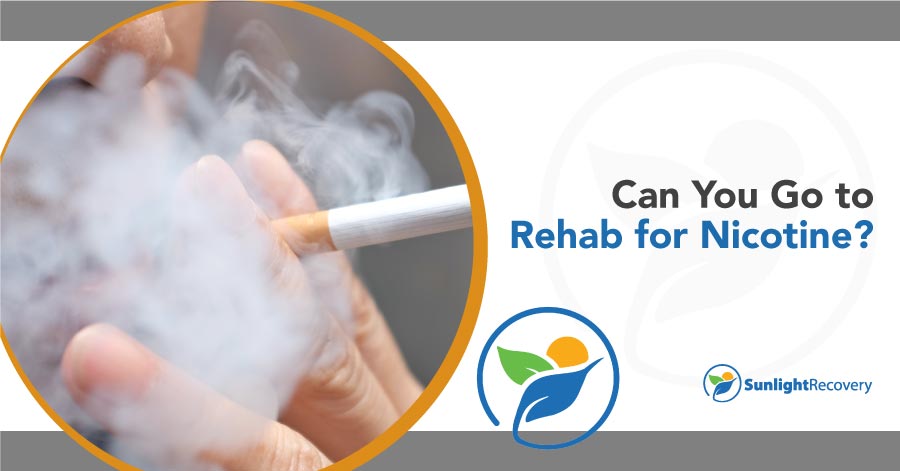Quitting smoking is hard. In fact, it’s one of the hardest things a person can do. But why is it so difficult? Nicotine has been normalized and accepted into society to the point that many people don’t consider it an addiction. Since its use has been downplayed, its addictive nature is rarely discussed among peers and in society. In this blog post, we’ll explore the difficulty of quitting nicotine and whether rehab can help people quit smoking.
Why Is It So Difficult to Quit Smoking?
Nicotine is known to be a highly addictive substance. In fact, it’s at least as addictive as cocaine and heroin. Once you’re addicted, it’s hard to break the habit. Nicotine is one of the key ingredients in cigarettes that makes smoking so difficult to quit.
Smoking is a relatively normal practice in society, and it’s not unusual to see people with the habit in everyday life. It’s not hidden away or stigmatized like other addictions. While some people may chastise you for smoking, it’s not something that will ruin your relationships the way other addictions can.
In reality, many people don’t realize how harmful smoking truly is. They may know it’s not good for them, but they don’t understand the extent of the damage smoking can do to their bodies. This makes quitting challenging because they don’t know how much they’re harming themselves every time they smoke.
Additionally, the support systems in place for smokers aren’t as strong as for those addicted to other substances. Rehab centers don’t usually treat nicotine use on its own. This makes it harder to get help when you’re trying to quit.
How Nicotine Use Has Been Downplayed in Society
Society has downplayed nicotine use for many reasons. Cigarettes are legal in countries where other drugs aren’t, so smoking doesn’t seem as serious as other addictions. Governments can levy taxes against cigarettes and other nicotine products, but they don’t do the same with other, less harmful drugs.
Most governments justify this decision by suggesting they shouldn’t restrict people’s vices through interventionist policies. But while moderation for other vices such as alcohol and fast food may provide some benefits, tobacco and nicotine offer none.
Also, tobacco companies have worked hard to hide the harmful effects of smoking. They’ve spent billions of dollars on marketing and advertising to make smoking seem glamorous. This makes it harder for people to see the damage smoking causes as they’re bombarded with images of beautiful people smoking. Attempts by governments to stop young people from taking up the habit fall short of an outright ban.
Nicotine is also used in other products besides cigarettes, such as e-cigarettes and vaping devices. These products have been marketed as safer than cigarettes, leading people to believe nicotine isn’t as harmful as it is.
Can You Go to Rehab for Smoking?
Most rehab centers usually provide programs for nicotine cessation. These programs are typically offered to patients admitted for a different reason, such as heroin abuse or mental health disorders.
Despite the well-known link between smoking and poor health, most insurance companies won’t cover the cost of rehab for smoking. However, some companies will cover the cost of nicotine cessation programs if they’re part of a larger treatment plan. For example, if you’re in rehab for another addiction and also smoke, your insurance company may be willing to cover the cost of quitting smoking.
Even though nicotine rehab isn’t as common as other types of rehab, it can be an effective way to quit. If you plan to enter rehab for other reasons and want support to quit smoking, consider looking into those that can help you kick the habit.
Since nicotine addiction is so difficult to overcome, it’s important to have all the support you can get when you’re trying to quit. Rehab can help you in the same way it helps addicts overcome other difficult addictions.
Can You Still Use Nicotine at Rehabs?
If you’re attending rehab for another reason, you’ll likely be able to smoke. While it’s not the healthiest option, it’s often viewed as a lesser problem.
Rehab centers understand nicotine is a coping tool people use, which is why most have dedicated smoking areas. Even so, patients are always encouraged to join the smoking cessation program as quitting smoking can positively impact their overall health and recovery.
However, patients who choose to keep smoking during their treatment won’t be discharged. Rehab centers want what’s best for their patients and to see them succeed in all stages of their recovery, which is why they encourage them to quit smoking.
Smoking cessation programs typically involve group therapy and individual counseling. These programs can help patients identify the triggers that lead them to smoke and develop coping mechanisms to deal with these triggers. In addition, patients are educated about the risks of smoking and the benefits of quitting.
How a Smoke-Free Life Benefits You
Quitting smoking has many benefits, both for your health and your wallet. The reality is that the benefits of stopping nicotine use far outweigh any potential benefits of using it. Here are some reasons you should quit for good:
- Decreases risk of developing cancer
- Improves your lung function and circulation
- Reduces your risk of developing heart disease
- Improves your sense of smell and taste
- Helps you save money by no longer buying cigarettes
Living a smoke-free life can be difficult, but it’s worth it in the end. If you’re struggling to find something to do with your hands after quitting smoking, try carrying around a stress ball or playing with a fidget spinner. These can help you cope with nicotine withdrawal.
Find Support for Nicotine Addiction
Smoking can be treated alongside mental health disorders or other addictions at rehab centers. At Sunlight Recovery, we offer a comprehensive approach to treatment that includes smoking cessation programs designed to help you overcome your addiction and live an addiction-free life.
If you’re struggling with addiction, contact us today. We can help you find the treatment you need to get on the road to recovery.






